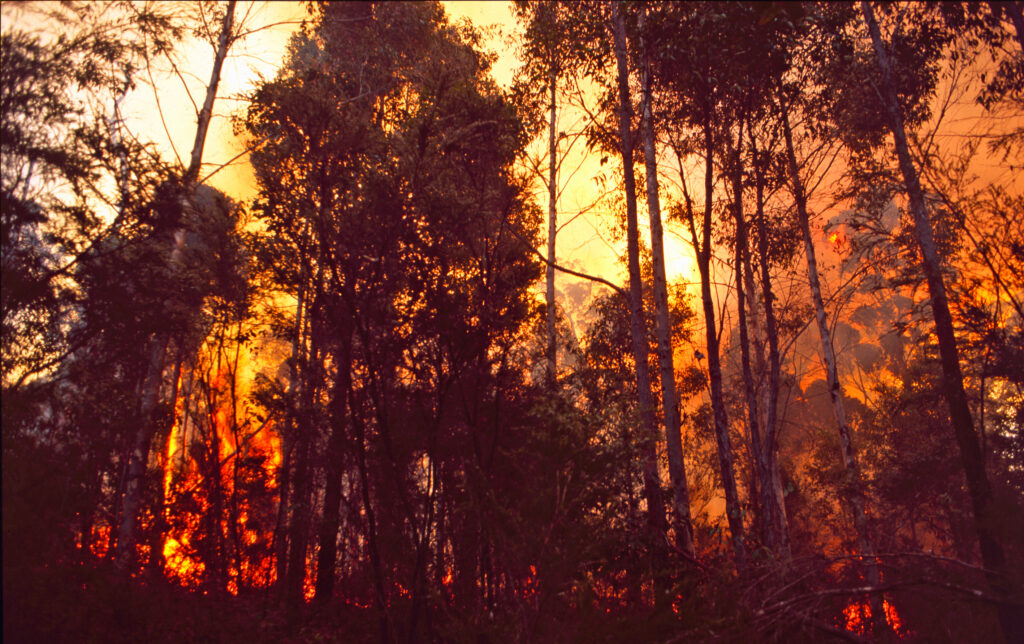Coal, oil and gas pose serious threats to human health, as evidenced by Doctors for the Environment Australia’s (DEA’s) new report Fossil Fuels are a Health Hazard.
The report, launched at an event at Parliament House on 14 August 2024 that was hosted by the Assistant Health and Aged Care Minister, Ged Kearney, outlines the serious health consequences of our ongoing use of fossil fuels and calls for governments, industries and individuals to treat this health emergency by rapidly phasing out coal, oil and gas.
The first and most obvious health consequence is that fossil fuels are the primary drivers of climate change, responsible for 75% of greenhouse gas emissions.
Climate change is arguably the greatest public health threat facing humanity, with the World Health Organization (WHO) warning that it threatens “to undo the last 50 years of progress in development, global health and poverty reduction.”
Impacts on health include the direct impacts of extreme weather events such as floods, storms, bushfires and heatwaves, and the indirect impacts of changing patterns of infectious diseases, rising sea levels, displacement, loss of infrastructure and threats to secure shelter, food and water.

The World Economic Forum estimates that by 2050, climate change will cause an additional 14.5 million deaths and the WHO estimates that between 2030 and 2050, there will be an additional 250 000 deaths per year from climate change-related undernutrition, malaria, diarrhoea and heat stress. This number does not include deaths from food and water insecurity, fires and smoke, floods, storms and extreme weather events, other infections, displacement and civil unrest.
Secondly, fossil fuels are our largest source of air pollution, which kills more people globally each year than smoking.
According to the State of Global Air Report 2024, 8.1 million people died in 2021 from air pollution, making it the second largest risk factor for death after high blood pressure, with smoking coming in third. Of these deaths, 58% were due to particulate matter 2.5 (PM2.5), the most readily measurable pollutant from fossil fuel production, and 6% were from ground level ozone, also produced by burning fossil fuels. Other sources estimate that 5.13 million to 10.2 million people die prematurely from fossil fuel air pollution every year.
Morbidity from air pollution includes increased rates of asthma, heart disease, cancer, learning delays and poor pregnancy outcomes.
Thirdly, fossil fuels are the source material for plastics, which cause land and water pollution and are harming our health. We are all at risk from microplastics and nanoplastics with evidence demonstrating increased complications of carotid plaques that contain plastics, as well as effects on our endocrine and reproductive systems. Workers at plastic production plants have an increased risk of lymphoma, leukaemia, and brain and breast cancer.
Lastly, fossil fuels are contributing to biodiversity loss, by fuelling climate change, land use change, and air and plastic pollution. This in turn threatens human health via impacts on food systems, water quality, immunological health, infectious disease exposure and pharmaceutical discovery. In Australia, climate change and biodiversity loss has contributed to increased community spread of Hendra virus, lyssavirus, Ross River virus and Japanese encephalitis virus.
When considered together, we must acknowledge the overwhelming magnitude of the harmful effects of coal, oil and gas, and recognise that fossil fuels are a health hazard. All across their life cycle — from exploration and extraction, to usage and disposal — they are harming the health of our patients and our communities. (See figure 1)

As health practitioners, we have an ethical responsibility to act.
Our profession has a proud history of advocating for regulations to address causes such as the health harms of tobacco, asbestos and engineered stone benchtops. The principle of nonmaleficence dictates that we now have a duty to call for a rapid phase out of coal, oil and gas.
We must voice our concerns that despite the indisputable evidence of harm, our governments are still allowing new coal and gas projects. Notable examples are the gas fields of the Burrup Hub and the Beetaloo Basin, which have estimated lifetime emissions of up to 6.1 billion and 3.2 billion tonnes respectively. The “1,000 tonne rule” states that there is one premature death for every 1000 tonnes of carbon burned, meaning that these two projects might cause around 9.2 million early deaths.
The DEA report outlines a treatment plan for governments, industry and individuals recognising the need for a multimodal approach. This is the most complex of all systems problems and it is only by widespread understanding and universal action that we will succeed in tackling the health hazards of fossil fuels. A summarised version of the actions we are asking the government for is presented below:
- ban all new fossil fuel projects and accelerate investment in renewables;
- stop financial subsidies to fossil fuel industries and redirect them to carbon-free initiatives;
- ban fossil fuel advertising and industry sponsorship;
- ban single-use and non-recyclable plastics and switch to reusable and/or compostable products;
- protect biodiversity and ban native forest logging;
- prepare health care and the wider community for what we can no longer avoid.
The last point is well addressed in the National Health and Climate Strategy, and we recommend this to the reader.
To conclude, coal, oil and gas are harming the health of humans and the planet on which we all depend. The harms they inflict are undermining our advances in public health and threaten our civilisation. It is not enough for doctors to stand on the sidelines as Australia continues to burn fossil fuels, watching while our communities and our natural world suffers the consequences. Just like we would with any other health threat, we need to advocate to protect health and treat fossil fuels like the health hazards that they are.
Dr Kate Wylie is the executive director of Doctors for the Environment Australia (DEA) and a GP.
Yufei Xu is a current final year medical student and the chair of DEA’s National Student Committee. Yufei is passionate about empowering and representing young people in climate and health.
The statements or opinions expressed in this article reflect the views of the authors and do not necessarily represent the official policy of the AMA, the MJA or InSight+ unless so stated.
Subscribe to the free InSight+ weekly newsletter here. It is available to all readers, not just registered medical practitioners.
If you would like to submit an article for consideration, send a Word version to mjainsight-editor@ampco.com.au.

 more_vert
more_vert
I have worked in the natural gas industry for over 30 years and have seen firsthand how the wealthy often exacerbate poverty in developing nations. The real issue isn’t fossil fuel emissions themselves but the sheer volume of emissions. Over the past century, we’ve quadrupled the global population and reduced poverty from 50% to 20%, largely due to affordable fossil fuels. Now, the challenge is to address the scale of emissions.
When countries ban natural gas extraction, they often turn to imports, as seen in Germany. Australia is following a similar path. New South Wales has banned gas exploration but is now constructing an LNG import terminal—LNG has 18% higher associated emissions compared to locally produced gas. The core question is this: if we are not willing to ban the use of natural gas, shouldn’t we opt for the option with the lowest emissions? That would mean developing local gas resources, such as Narrabri and Beetaloo.
What we do to the planet, we do to ourselves. Great to see doctors standing up for health – that’s our job after all.
To those “Australian” readers who have been subjected to strawman arguments about medicines being dependent on fossil fuels, you should first know that no one is suggesting that we stop oil coal and gas overnight, rather that there is an orderly and rapid transition to a non fossil fuel economy. Yes we’d still need a small amount of fossil fuels for pharmaceuticals and other feedstock, but the point is we do not need NEW or EXTRA fossil fuel resources. So arguing that we do is either disingenuous or completely misses the point.
As professionals trained to scrutinize publications for bias, it is also beholden on doctors to identify dangerous misinformation and FUD (Fear, Uncertainty and Doubt) published widely by organizations (such as The Australian) that have vested interests in delaying a transition away from Fossil Fuels until every last dollar can be made from gas reserves for their masters – DESPITE all the science and experts and UN telling us that they must remain in the ground.
Doctors have a responsibility to call out harm when harm when they see it – especially when the evidence is overwhelming, as it is with fossil fuels.
And yes, the health industry needs to get off fossil fuels and minimise waste too – with the energy and transport it uses, in medical supplies and patient care. We need a resilient health system that minimises the damage that it causes to people and the environment upon which we all depend for clean air and water and safe and secure supplies food. Let’s just get on and do what needs to be done.
Australia makes up 5% of the world’s land masse yet we have 34% of the worlds Uranium reserves. Unfortunately, natural fossil gas is not pure methane. It also contains radioactive Radon gas. Two exploratory boreholes in the Kimberley (Canning Basin) have yielded Uranium and Radon gas in water.
Unlike the gaseous radon itself, radon daughters are solids and stick to surfaces, such as dust particles in the air. If such contaminated dust is inhaled, these particles can stick to the airways of the lung and increase the risk of developing lung cancer.[4]
Permissible releases of radioactive material and decay products or progeny are cumulative
on grass which cattle and sheep eat, leaf vegetables, grain, fruit, berries, tobacco leaves, soil, water and seafood thus entering the food chain.
Health consequences
Embryos 50 times more vulnerable to genetic mutation than adults
Children; 10 times more vulnerable to genetic mutation than adults
Latency period for tumour formation and leukaemia shorter in children than in adults.
And shorter still in embryos.
Genetic mutations passed on to succeeding generations.
What do nearly 99 per cent of pharmaceutical feedstocks and reagents, plastics used in a wide range of medical devices, supplies and packaging, detergents, hand sanitiser, disposable gloves disposable syringes, bags that hold blood and saline, disposable masks, together with over 65% of electricity generated in Australia have in common?
One guess. The authors wont like the answer.
Your group also needs to put out a statement on the mega health and environmental costs of wood heaters, only used by about 1 in 10 people. The issue has been ignored for years, in spite of large health costs, being a minimum of $4,000 and above per wood heater per year. Leading respiratory physicians are well aware of the problems. In Greater Sydney a NSW government Sydney Air Quality Study shows that residential wood heaters top the health costs for all air pollution sources, at over $2 billion annually – just from wood heaters!
Thank you for raising this important issue at a time when climate change health impacts are being felt throughout the world.
Is it true that 6000 products are manufactured or depend on fossil fuels? Recent article in The Australian
If true –
If we eliminate fossil fuels and plastics how do we replace the 6000 products manufactured from fossil fuels ?
In particular how do we manufacture essential medical and pharmaceutical goods manufactured from fossil fuels ?
Great thorough exploration of all the ways that fossil fuels harm health – thanks for the article and all that DEA does.